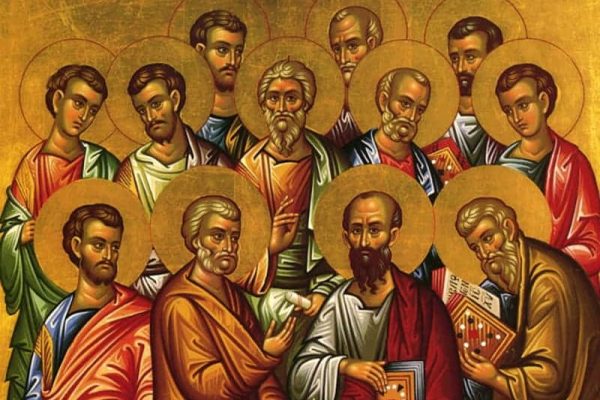Home>Christian Resources>What Is An Idol And How Is It Considered Idolatry?


Christian Resources
What Is An Idol And How Is It Considered Idolatry?
Modified: January 9, 2024
Jason DeRose, Managing Editor at Christian.net, uses his expertise in religion and journalism to deepen understanding of faith's societal impacts. His editorial leadership, coupled with a strong academic background, enriches the platform’s diverse content, earning him recognition in both journalism and religious circles.
In discovering what is an idol, we uncover the threats, consequences and examples that break our bond with God and the love He has for all.
(Many of the links in this article redirect to a specific reviewed product. Your purchase of these products through affiliate links helps to generate commission for Christian.net, at no extra cost. Learn more)
What is an idol? Well, Idolatry and idols are two words mentioned numerously in the Bible. 1 Corinthians 10:14 says to flee ourselves from idolatry. But, what does it really do? Today, we see celebrities calling themselves “pop idols” or compliments towards famous people tagging them as their “idols”. Are all these considered an offense to God? Above all, why is idolatry offensive to God in the first place and are idols different from what and who they were before? Idolatry is a major theme of the Bible for it challenges God’s sovereignty. It extends beyond the worship of images and false gods and is a matter of the heart. In our journey in life as children of God, we have to keep our faith strong to stand against idolatry, and here’s why.
What Is An Idol?
1 John 5:21 is clear about this; we must keep ourselves away from idols. Taking a closer look, the Bible verse didn’t clarify what is an idol in exact words. Instead, it only says “keep yourselves away from idols”. But, what if there’s a reason behind that? What if the verse didn’t specifically state who and what are idols because they vary depending on the person’s lives. To put simply, an idol is something or someone that we put before God. One passage in the Bible, Colossians 3:5 – 6, answers the question of what is an idol.
Colossians 3:5-6 Put to death, therefore, whatever belongs to your earthly nature: sexual immorality, impurity, lust, evil desires and greed, which is idolatry. Because of these, the wrath of God is coming
Idols dull our spiritual hearing and harden our hearts towards God. Whenever we start seeking something that isn’t of God because we feel ungrateful and dissatisfied by His love, whatever and whoever that this, becomes our idol. Essentially, an idol is anything that takes the place of God as the most important focus and priority in our lives. Here are the two most common types of idols.
An Idol Can Be Human
In answering the question of what is an idol, it’s easier to envision a person probably famous or highly influential. Indeed, this answer is also correct. We are to make no mention of any “gods” from our lips (Exodus 23:13) but, what’s the extent of liking or appreciating someone to the point that they become our so-called “gods” or in this case “idols”?
Appreciating and admiring people we look up to and get inspiration from is harmless. In fact, God encourages us to speak well of our brothers and sisters. However, this becomes dangerous when our world revolves around a person and our admiration towards them. It’s easy to discern whether or not we see someone as an inspiration or as an idol. If we start thinking, seeing, and admiring someone who isn’t God more than we should admire God, this then becomes extremely dangerous.
Most of the time, idols that are human are derived from an extreme form of infatuation or admiration towards a popular personality or talent. But, it should also be noted that a person’s extreme desire to be with a person or their insatiable want to inflict an impact on a human being is idolatry. If one is spending most of what they have on a person instead of God then, that person is looking at a wrong and made-up “god”.
An Idol Can Be A Non-Human
Idols do not necessarily have to be made out of flesh and blood. Surprisingly, the most common form of idols isn’t human. Instead, these pertain to desires, false images, and made-up realities people put before God. Exodus 20:3-6 makes clear of this; God commands us to not put any other gods before us. He also warns us about creating anything that is in similarity to anything in Heaven.
Wanting to achieve something or having dreams are completely normal. For instance, if a person desires to become globally-famous, they should by all means try to reach their dream. However, if this person takes it to the next level by placing this desire for fame as the center of their lives instead of doing so with God, his desire becomes the very false god he serves, an idol.
Another common example is excessive self-esteem. When a person views himself or herself as someone who can completely stand without God, this person’s dangerous perspective becomes the bridge to creating a false image of himself as his very own god. Basically, anything internal that is so pursued and desired by ourselves to the point that it changes our lives externally is our idol or our false god. There are many answers to the question of what is an idol. However, we should keep in mind that all of these must be taken out of our lives because there’s only one God.

The Lethal Components Of Idolatry
Isaiah 44:17 shows us a clear depiction of idolatry: (And the rest of it he makes into a god, his idol, and falls down to it and worships it. He prays to it and says, “Deliver me, for you are my god!”) From this, we are able to grasp something; humans create their own idols. The reason why idols are different per person is just like how different students come up to different opinions in an essay-writing competition. Still, this doesn’t take out the fact that idols are made-up and lethal.
As for answering what is an idol and what makes desire become idolatry, we must remember how severity plays a big role in the picture. As stated earlier, it is normal to want and pray for something. But, these are the components to look out for that separates idolatry from appreciation.
Idolatry Is Acknowledgement
Isaiah 2:8 speaks about how people with idols bow down to the work done by their own hands. This means that idolatry begins when a person insists on doing or pursuing their idols despite knowing what’s right or wrong. For example, if someone severely “idolizes” their addiction for alcohol. They are well-informed of their addiction, they acknowledge it, and most of the time, they even justify it. But, this doesn’t stop them from drinking more.
See, the problem in this situation lies in the fact that this person is more persistent in pursuing alcohol although he knows that this is doing to his body and life instead of pursuing God. Here’s a rule of thumb; what you spend your energy, appreciation, time, and life more is your god. If one chooses to offend God than praising Him, this person possesses a false god or “an idol”.
The Level Of Idols
Idolatry is more than just knowing what is an idol and how it ruins our sense of gratitude and dependence on God. If a person were to desire something or someone so much to the point where their happiness is no longer from God, this desire is most likely to become idolatry. But remember, idolatry blossoms into nothing, and we will get nothing from adoring false idols (Isaiah 44:9-20).
On the other hand, serving God alone saves us even after we die. So, we have to keep in mind where we get our happiness from. In actuality, the alleged joy that comes from idolatry isn’t genuine. Basically, it is just a minimal trigger of earthly satisfaction that guarantees no peace nor eternal joy since only God can offer these. If a person truly desires to be saved, he or she must save themselves from idolatry first.
Idolatry Makes Us Irresponsible
The Bible warns us about how we become slaves by those who are not God (Galatians 4:8 ). Truth is when we are too occupied by the things we idolize, our lives will slowly turn into something that’s unproductive, unsatisfying, and unreal. When we serve the Lord, our lives are well-kept in His hands. His Love allows us to see better in life; we can discover our given talents, love our families, and happily cherish the Lord’s promises to those who believe Him.
But, idolatry is different. This deviates us from our dreams God has perfectly and lovingly set out for all of us to enjoy. When we are too fixated on the things that shouldn’t be seen as high as we do, we lose our track on God and the path He wants us to walk. An example of this is how people who extremely adore a certain public personality would miss their jobs, classes, or any other opportunities just to attend any program or concerts of their favorite celebrities. Our true God wants all of us to genuinely be successful and expressive with our lives. He doesn’t want us to waste a single second of our lives, unlike the idols we create in our minds.
Idolatry Chooses Enjoyment Over Joy
There’s a big difference between enjoyment and joy. When you love and serve God, you will feel the that doesn’t depend on any external and man-derived source. It’s consistent and undying, serving God guarantees joy without having to achieve or get anything in particular. On the other hand, idolatry is merely enjoyment. A person with idols “enjoy” the passing feeling of purchasing something, achieving something, or seeing someone. When their source of enjoyment isn’t around or cannot be attained, they are left with emptiness and frustration.
A timely example of this is a failure. When we serve God and only Him, we know that failure is still a blessing. We won’t get fazed by failures because we know that He has plans to nourish and flourish our future. However, a person who serves earthly success is the opposite of this; this person enjoys success so much that when he or she fails to get it, sadness, rage, and disappointment are all that’s left at the end of the day.
Idolatry Is Selfish
Loving God is like a two-in-one set; if you love God, you’ll learn to love His people as well. This is a wonderful feeling, a person who loves others never runs out on warmth and empathy. This is just one of the many benefits of serving God. But, idolatry contradicts this. It is associated with pride, self-centeredness, greed, gluttony, and love for possessions (Philippians 3:19). Having idols separates our ties with people and makes an illusion of benefiting only ourselves.
Most of the time, idolatry makes a person heartless. For example, if a person is blessed with money, a believer of God sees this as a blessing and a responsibility to stretch God’s Grace into those with need. But, a person who idolizes money will keep this only for himself. God teaches us to give while idolatry teaches us to keep. The difference between both is humongous.

The Consequences Of Idolatry
After answering the question of what is an idol, the most important question would probably be “what does having an idol do to God?”. To answer this, let’s look back on the Great Commandments set for us from God. In Exodus 20:3, God tells us that we should have no other gods than Him. This is then again mentioned in Matthew 22:36-38 where it is revealed that the first commandment is to love God with all our hearts, minds, and souls.
Of course, we fail to follow these commandments if we have idols in our lives. Truth be told, Matthew 6:24 reminds us that we cannot serve to masters at a time. If you serve God, you cannot serve idols. But remember, the consequences of idolatry is high. This sin not only offends God but, neglects the love He offers to His people. Here are the following consequences for the sin of idolatry.
Idols Keep God Away
It’s easy to understand, would we want to offer the food we made to someone who is allergic to the ingredients we used? No, right? In the same manner, God cannot let a person experience His Grace and Love to those who deny and neglect it in the first place. When a person rejects the God’s word, God also rejects this person consequently (1 Samuel 15:23).
Judges 10:14 Go and cry out to the gods you have chosen. Let them save you when you are in trouble!
Judges 10:14 is a powerful verse in understanding how idolatry causes God to hide His face from our lives. The verse tells us to go and cry out to the gods we’ve chosen and let them save us from our distress. Obviously, this act is only something God can do. But, if we choose to blind ourselves from this then, the results are a given.
Idolatry Is An Abomination
It’s more than just God disliking idolatry. To Him, idolatry is an abomination (Deuteronomy 27:15). Of course, doing something that’s an abomination to God comes with serious consequences. The Bible warns that those who practice these sins will not inherit the Kingdom of God (1 Corinthians 6:9). This is why idolatry is dangerous; it takes away our lives even when we are still living and after living, it takes away our inheritance. So, staying away from it is the wiser option to choose from.
Idolatry Leads To Destruction
There is a reason why idolatry is frequently mentioned in the Bible; it’s so dangerous that God reminds us about it constantly. In Deuteronomy 7:26, we can see how we are commanded to detest idolatry. This is for our lives, we benefit from loathing idolatry. God is a loving and merciful God, He would not want to see our lives drown in destruction because of idolatry. This is why He detests it and commands us to stay away from it.
Read more: Why Is Fish Not Considered Meat During Lent?
Idolatry Is Contagious
Sin and idolatry sit beside each other. It is contagious in a way that it attracts more and more sins to pile up in our lives. For instance, if we idolize money, it is so contagious that it becomes greed, it is so addictive that it turns into a strong force that teaches us to steal and to lie. From there, the list of offenses we choose over God just keeps on towering upon each other. If this continues, our sins will sever our ties with God.
Returning To God

The thing is, God loves us. He has blessed us with everything we love and cherish in our lives and He plans on doing that forever. Rejecting idolatry is more than just a command, it’s God’s desire to set us free from the things that break us. We must have faith in Him, that He will always be with us and will never let us fall. The Bible not only records people’s failures; it also records the hope of repentance. In his mercy, God will forgive and will always let us fall into his loving arms once again. Wherever we are in our lives, we must return to God in order for us to live today and live more tomorrow. Every day is a blessing for us to love and serve God, we shouldn’t allow idolatry to take this blessing away from us.












